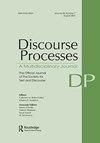Social justice reasoning when students learn about social issues using multiple texts
IF 2.1
2区 心理学
Q2 PSYCHOLOGY, EDUCATIONAL
引用次数: 0
Abstract
ABSTRACT In this paper, I apply the Multiple Documents Text-Based Relevance Assessment and Content Extraction (MD-TRACE) model, to describe the types of cognitive processes that students engage to critically reason about social issues, as they are portrayed through mass media. In addition to examining such processes, I further consider the extent to which these are reflective of social justice reasoning, or students’ critical reasoning about social issues in ways that recognize and analyze inequities in society. Three studies are introduced to provide empirical examples of how cognitive processes, identified in the MD-TRACE, may function within the context of students’ reasoning about mass media. The processes examined include selection (Study 1), processing (Study 2), and integration (Study 3). Study 1 examines the types of perspectives that students propose seeking out in association with various social issues and the extent to which these perspectives may belong to marginalized groups (i.e., selection). Study 2 examines students’ critical reasoning about or abilities to critique two deliberately constructed texts during processing. Study 3 investigates students’ specific abilities to identify and critique narrative frames, or common reporting tropes, introduced across texts (i.e., integration). Together, these three studies serve as exemplars of students’ engagement in reasoning about mass media and social justice reasoning. They suggest that social justice reasoning involves, in part, students’ engagement in perspective taking, their application of prior knowledge to contextualize information in texts, and their recognition of common narrative frames across texts and the values that these uphold. Additional social justice reasoning strategies are suggested and directions for future research proposed.当学生使用多个文本学习社会问题时,进行社会正义推理
摘要在本文中,我应用了基于多文档文本的相关性评估和内容提取(MD-TRACE)模型,描述了学生通过大众媒体描述的对社会问题进行批判性推理的认知过程类型。除了研究这些过程,我还进一步考虑了这些过程在多大程度上反映了社会正义推理,或学生对社会问题的批判性推理,以识别和分析社会中的不平等。介绍了三项研究,以提供MD-TRACE中确定的认知过程如何在学生对大众媒体进行推理的背景下发挥作用的实证例子。所检查的过程包括选择(研究 1) ,处理(研究 2) 和集成(研究 3) 。学习 1考察了学生提出的与各种社会问题相关的观点类型,以及这些观点在多大程度上可能属于边缘化群体(即选择)。学习 2考察学生在处理过程中对两篇刻意构建的文本的批判性推理或批判能力。研究3调查了学生识别和批评跨文本引入的叙事框架或常见报道比喻的具体能力(即整合)。这三项研究共同成为学生参与大众媒体推理和社会正义推理的典范。他们认为,社会正义推理在一定程度上涉及学生的视角选择,他们应用先验知识将文本中的信息情境化,以及他们对文本中常见叙事框架和这些框架所维护的价值观的认可。提出了更多的社会正义推理策略,并提出了未来研究的方向。
本文章由计算机程序翻译,如有差异,请以英文原文为准。
求助全文
约1分钟内获得全文
求助全文
来源期刊

Discourse Processes
Multiple-
CiteScore
4.30
自引率
4.50%
发文量
27
期刊介绍:
Discourse Processes is a multidisciplinary journal providing a forum for cross-fertilization of ideas from diverse disciplines sharing a common interest in discourse--prose comprehension and recall, dialogue analysis, text grammar construction, computer simulation of natural language, cross-cultural comparisons of communicative competence, or related topics. The problems posed by multisentence contexts and the methods required to investigate them, although not always unique to discourse, are sufficiently distinct so as to require an organized mode of scientific interaction made possible through the journal.
 求助内容:
求助内容: 应助结果提醒方式:
应助结果提醒方式:


